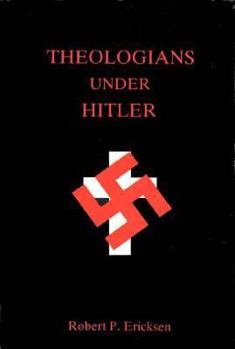Theologians Under Hitler: Gerhard Kittel, Paul Althaus, and Emanuel Hirsch
Select Format
Select Condition 
Book Overview
What led so many German Protestant theologians to welcome the Nazi regime and its policies of racism and anti-Semitism? In this provocative book, Robert P. Ericksen examines the work and attitudes of... This description may be from another edition of this product.
Format:Hardcover
Language:English
ISBN:0300029268
ISBN13:9780300029260
Release Date:January 1985
Publisher:Yale University Press
Length:245 Pages
Weight:1.20 lbs.
Customer Reviews
1 rating
The Perils of Existential Theology
Published by Thriftbooks.com User , 23 years ago
This is an in depth study of the work of three Protestant theologians who were supportive of the Nazi regime. The author contrasts them with Karl Barth, Rudolph Bultmann, Paul Tillich, and Dietrich Bonhoffer, all of whom opposed Hitler. The introductory chapter entitled "The Crisis" is particularly valuable. It places the thought of all of these German theologians in the intellectual stream of Luther, the Enlightenment, German idealism, theories of history, and especially existentialism (Kierkegaard) and dialectical theology with its stress on the infinite distance between God and humans. This latter teaching creates a problem in conceptualizing how God's actions intersect with human history. Ericksen highlights the irrational element in the prevailing intellectual cllimate of the time and documents the powerful influence of the concept of the German "Volk," especially in the theology of Hirsch.Although the author agrees that in hindsight and on the basis of their actions we can distinguish between these three theologians and their counterparts who opposed Nazism, he is not certain that their theology alone accounts for for their welcoming of the Third Reich. It is just too similar to the theology of those who opposed Hitler. Nor is the author certain that this kind of theology could prevent a recurrance of the phenomenon of theologians supporting a totalitarian or dictatorial regime in some future time of crisis."The connecting link between the broader intellectual crisis of the twentieth century and the circumstances of modern theology is that both secular and religious intellectuals in this age must ultimately rely upon an existential leap of faith. This was the fate of Croce, Durkheim and Weber as well as Barth, Bultmann and Tillich. In terms of value judgments, the problem with existentialism is that it is morally neutral. A leap of faith towards Hitler is no less valid than a leap of faith away from him." (p. 24)All in all, Ericksen paints a thoughtful portrait of three brilliant and enigmatic theologians. He also gives us reason to question whether current theologians would do any better when faced with a similar crisis.




